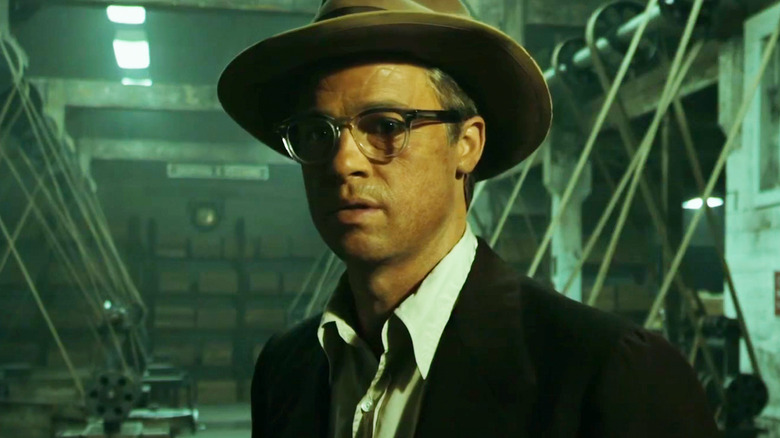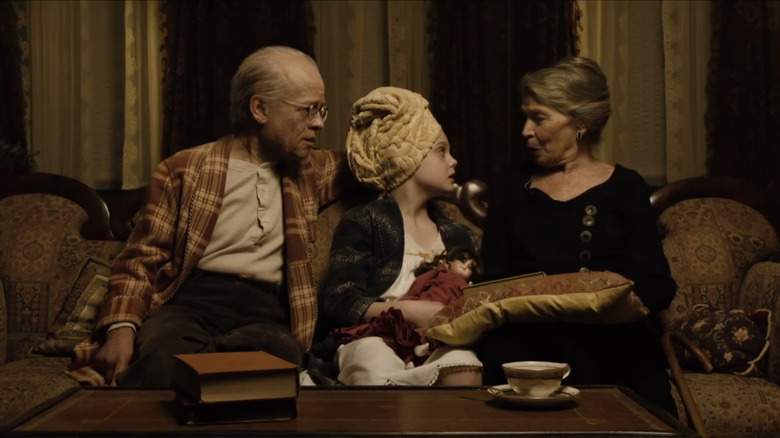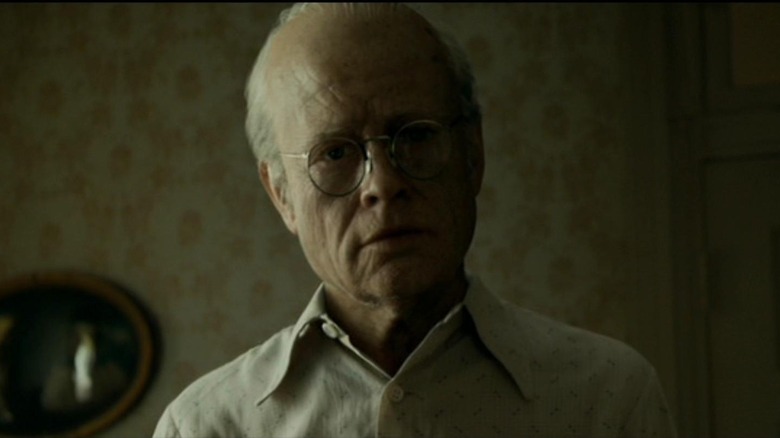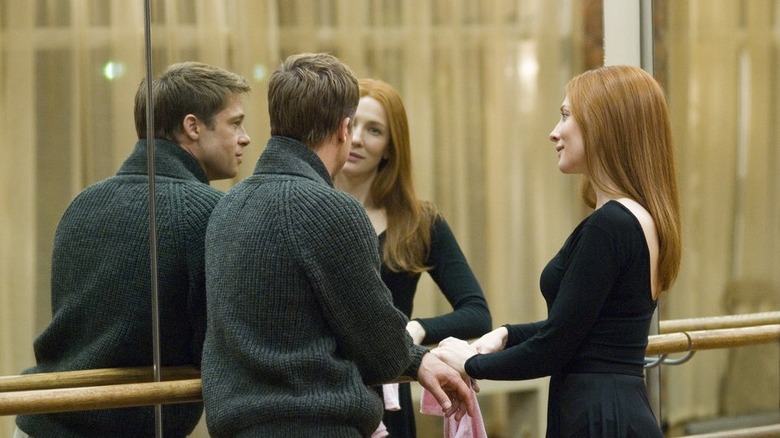David Fincher Had To Wait Half A Decade To Make The Curious Case Of Benjamin Button
"The Curious Case of Benjamin Button" is perhaps David Fincher's strangest film (if you don't count that time he summoned a cursed CGI Orville Redenbacher). Strange not because of disturbing CGI resurrections of beloved cultural figures, but because it doesn't feel like any other Fincher movie. It was well-received upon its 2008 release, but some derided its sentimentality, which according to Peter Bradshaw made for a "twee and pointless" movie. But the sentimentality is what makes "Benjamin Button" such a fascinating entry in its director's filmography, which is otherwise characterized by a coldly cynical tone. This might be the only time in Fincher's career that he was accused of being "twee" in any sense of the word.
There was definitely a sense that in the post-9/11, post-2008 financial crash world, people had more pressing concerns than watching Brad Pitt age in reverse. But that didn't stop the movie from making $330 million at the box office and vastly outperforming Fincher's previous effort. His 2007 thriller "Zodiac" struggled at the box office, even while being widely praised for its comprehensive retelling of the Zodiac killer saga. With "Benjamin Button," Fincher couldn't have thrown more of a curve ball, following up his serial killer drama with a sweeping tale of love and loss and effectively capturing a whole life within 2 hours and 47 minutes.
But the director wasn't simply reacting to audience trends by switching things up so dramatically. He'd been working on "Benjamin Button" prior to "Zodiac," at times developing the two movies simultaneously. Even prior to that, there were numerous attempts to produce an adaptation of F. Scott Fitzgerald's 1922 short story, all of which came to nothing. And so the project had been languishing in development hell for almost as long as the lifespan of its eponymous character.
Faulkner to Fincher
According to Reuters, William Faulkner wrote a script based on F. Scott Fitzgerald's story all the way back in 1943, before studio chief Jack Warner axed the whole thing. It was revived in the 1980s when former agent Ray Stark got ahold of the rights and brought the project to director Ron Howard. At the time, there was simply no way to tell the story without using multiple actors to portray Benjamin at the various stages of his life. This, according to producer Marykay Powell, was ultimately "the key thing that kept it locked in development hell."
And that's exactly where the project stayed for decades, even passing through Steven Spielberg's hands at one point before finally Eric Roth, a mutual friend of David Fincher and Brad Pitt, produced a new script draft. After Roth's rewrite made the rounds, Fincher claimed he was, "deemed unfit" and told, "There's not a body count here for you" — which there wasn't. Roth's script was full of much of the same romantic sentimentality as his screenplay for 1994's "Forrest Gump."
But Fincher, seemingly undeterred, got ahold of his "Fight Club" and "Seven" collaborator Pitt, who had also been sent the script, and talked over what they could do with a story devoid of any horrific murder tableaus or serial killers. And while the director's prior films weren't exactly going to convince Paramount that he was the man for the job, his plan to use one actor (Pitt) to play Button, alongside digital de-aging effects, was enough to convince the studio. In 2003, some 60 years after Faulkner had given it his best shot, Fincher was given the green light to finally adapt Fitzgerald's short story. Unfortunately, he would still face a monumental task in bringing "Benjamin Button" to the big screen.
Budget, subject matter, and Hurricane Katrina held things up
As David Fincher told Film Comment in 2009, actually making the film "took for f****** ever." Originally he and his team were supposed to work on "The Curious Case of Benjamin Button" before turning their attention to "Zodiac" but, according to Fincher (via Reuters), "because it was expensive, it's a drama, it's about death," the project struggled to get off the ground. The director needed $150 million and Paramount wasn't having it. That, and as he explained to Film Comment:
"Just before 'Zodiac,' [Hurricane] Katrina hit. And we sort of thought, 'Well, that's off.' And we sent the locations manager to New Orleans about six weeks after Katrina, and he called and said, 'It's all still here, everything we want to get at. There's no public works system and all the trolley shots we're going to have to fake, but it's basically still here, and if you want to risk it, come down. I don't know if I can get you plywood to build sets, but there are hotels that are dying to put people up.' So we sort of rolled the dice at that point, and we went to the studios and we said we think we can do it for this number and they said, 'Okay, that number, not a penny more,' and we called Brad, we called Cate [Blanchett] and said, 'We're on.' October 2006."
It helped that Paramount came to an agreement with Warner Bros. to split the cost of the movie. And once "Zodiac" was in the bag, Fincher and co. set off for New Orleans to finally shoot "Benjamin Button" five years after the director was first given the green light.
The cynic's love story
Ultimately, "The Curious Case of Benjamin Button" stands as a heartfelt ode to life itself — depicting with a tenderness, unusual for David Fincher, the dynamics of existence and the inherent meaning death bestows upon it all. Which is odd, considering Brad Pitt told Charlie Rose both he and Fincher are "cynics at heart." The director's oeuvre is testament to that, and he's been quoted as claiming he was interested in the project because he saw it as a "death story" rather than a love story. But all you have to do is watch the thing and experience its truly moving and at times poignant tale to get a sense that Fincher might, for a brief moment, have let his inner cynic take a back seat for once.
The director, who had lost his father in 2003 — the same year Paramount gave him the go ahead for "Benjamin Button" — was clearly thinking in reflective, existential terms at the time. That's probably a big part of why this film is such an outlier within his filmography and no matter how much he's tried to play down the sentimentality since its release, the movie clearly has too much heart to be the product of a pure cynic. Unfortunately, that didn't translate to an easy production. As Fincher explained, "When you say you're making a movie about life and death for anyone who has had children or anyone who has had parents, Hollywood is not going to beat down your door." But as someone who's enjoyed "Seven," "Zodiac," and "Mindhunter," I have to say I'm glad "Benjamin Button" exists and might go as far as to say it's Fincher's best.



